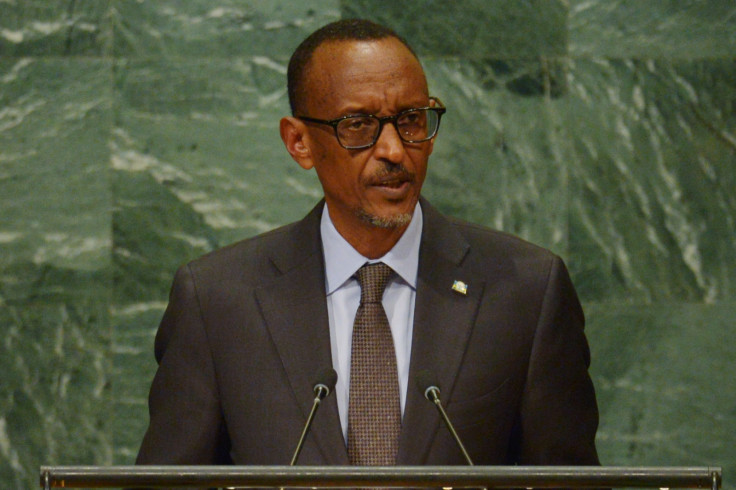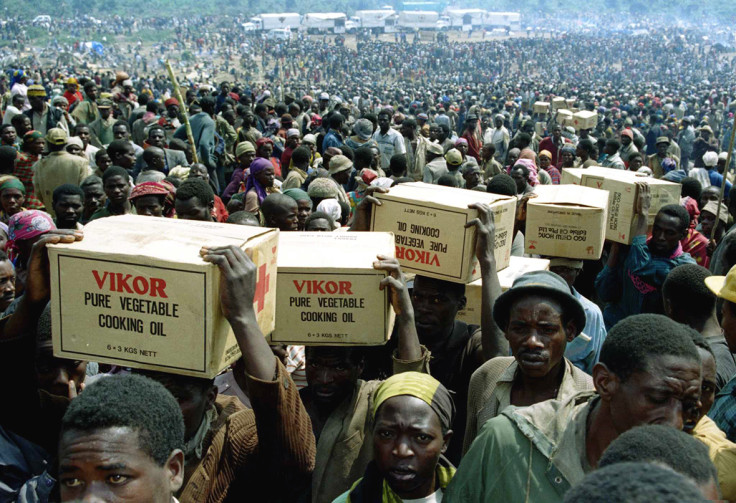French probe into Rwandan genocide 'nothing to do with destabilising Kagame'
Exclusive: IBTimes UK interview with opposition group RNC over France's probe into 1994 genocide.

The US-based political group Rwandan National Congress (RNC) has denied it is trying to destabilise the government of Rwanda's President Paul Kagame ahead of next year's presidential election. The claims surfaced earlier this month after France decided to re-open an inquiry on the assassination of Rwandan Hutu president, Juvénal Habyarimana, whose death sparked the 1994 Rwandan genocide.
French investigators said they want to hear evidence from Rwandan political dissident and former general Kayumba Nyamwasa, who alleged Kagame was involvement in the assassination.
Habyarimana died in a plane crash on 6 April 1994, an incident the Rwandan Tutsi were blamed for.
The crash triggered mass-massacres of Tutsi and moderate Hutu by Hutu extremists in the country. At least 800,000 people were killed in three months.
Following France's decision to re-open the investigation, an analyst on the Great Lakes region, Phil Clark, reader in international politics at Soas University, London, told IBTimes UK the alleged evidence Nyamwasa holds against Kagame could be a way for the RNC, of which Nyamwasa is a co-founder, "to destabilise Kagame's government ahead of next year's Rwandan presidential elections".
However, Jean Paul Turayishimye, RNC co-founder and spokesperson for the group, denied the claims. "This case has nothing to do with the RNC. It is related to an individual who knows something about a plane crash," he told IBTimes UK.
What is the RNC?
- A political dissident group that represents the exiled opposition of the Rwandan government
- Founded in the US in 2005
- Prominent members inlcude Kayumba Nyamwasa, Theogene Rudasingwa, and Jean Paul Turayishimye
"This case did not start today. A lot of people have been saying that they have evidence of President's Kagame involvement in the shooting down of the plane. In 2012, Nyamwasa said during his trial on attempted murder in South Africa that he was in a position to know of Kagame's involvement in the plane crash," he continued.
"Nyamwasa is repeating the same thing, but this time, the case is going to be investigated by French authorities, that's why you are seeing it in the media. Nyamwasa is someone credible, someone who knows what is talking about. The credibility of witnesses has changed."

Paul Kagame's position and France's role
Kagame and the Rwandan government have not replied to a request for comments. Kagame was the head of the rebel movement Rwandan Patriotic Front (RPF) – now Rwanda's army – which defeated the genocidal forces in 1994.
More on Rwanda's election
President Paul Kagame: 'I did not ask for a third term but Rwandans want me to stay'
Green Party urges Rwandans to vote against constitutional amendments
'We could only dream of making this progress since genocide'
The leader, who denies any involvement Habyarimana's murder, criticised France's decision to re-open the investigation. Kagame has always maintained Habyarimana was killed by Hutu forces, who used his death as an excuse to start massacring Tutsi.
Kagame became president of Rwanda in 2000 and relations between the African nation and France have been deteriorating since.
In 2006, Rwanda cut ties with France after a judge had called for Kagame to stand trial before a UN court over the 1994 plane crash.
In 2008, Rwanda released a report accusing French forces of taking part in the killings of Tutsi, and Hutu who hid Tutsi. French troops were also accused of raping Rwandan women.
The French embassy has not responded to a request for comments on allegations on the French troops' role in 1994. However, France has always denied the accusations and maintained its troops were deployed to protect civilians in 1994.
In December 2015, French army officials denied allegations that troops active in Rwanda in 1994 had failed to prevent the killings of some Tutsi in the Bisesero hills, in spite of being allegedly informed that the civilians were at risk of being killed.
Earlier this year, General Jean-Claude Lafourcade, head of France's UN mandate in western Rwanda in 1994, denied French troops had given munitions to Hutu rebels.
"No munitions, not even a bullet, was given [to the Hutus ] by Operation Turquoise," he said during hearings on the Biserero killings. "Where the French soldiers were, there were no massacres nor abuses. It took some time for the reality of the genocide to sink in, seeing... the presence of mass graves, burned villages."
© Copyright IBTimes 2025. All rights reserved.




















